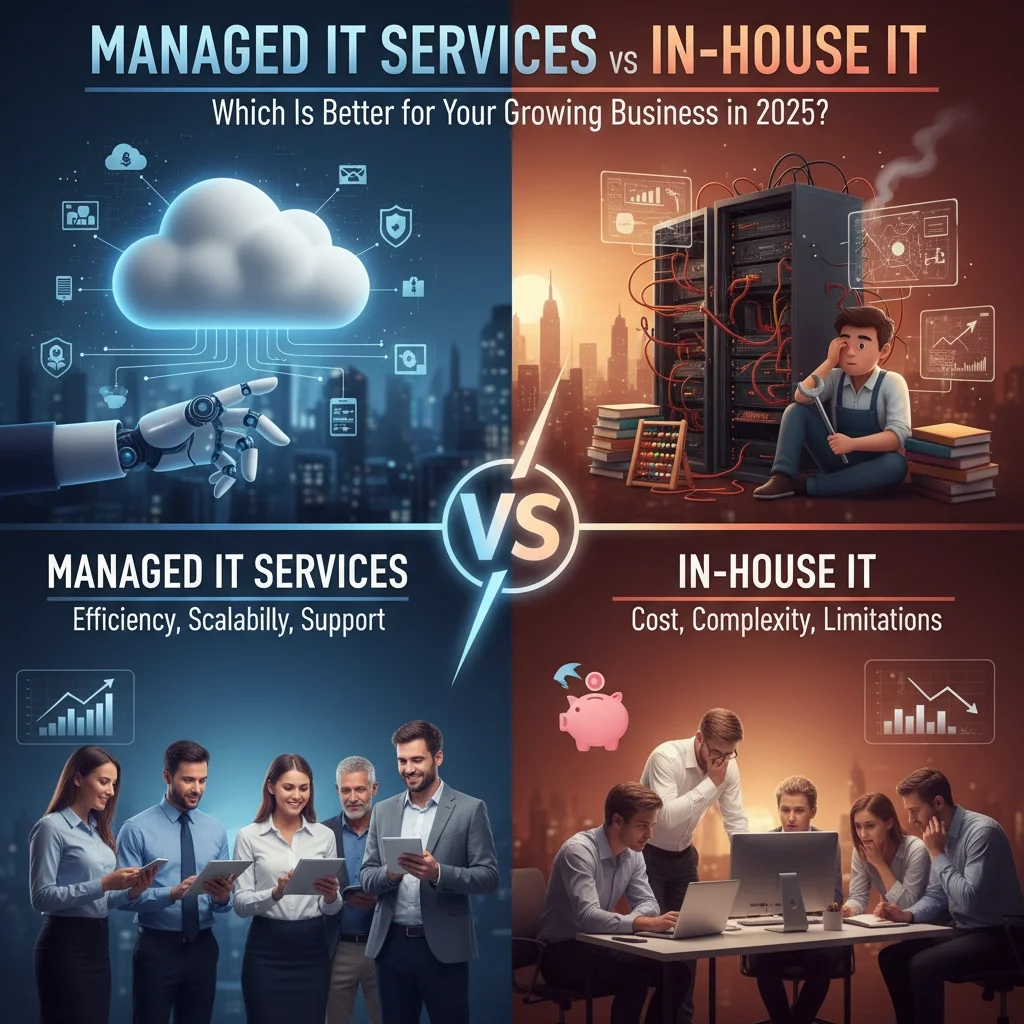Managed IT Services Vs In-House IT: Which Is Better for Your Growing Business in 2025?
For growing businesses in 2025, choosing between managed IT services and building an in-house IT team represents one of the most critical strategic decisions you'll make. This choice directly impacts your operational costs, security posture, scalability, and ability to focus on core business growth. The right decision depends on your company size, growth trajectory, budget constraints, and specific technology requirements.
The landscape has shifted dramatically in recent years. Remote work, cloud adoption, cybersecurity threats, and AI integration have made IT management more complex than ever. Meanwhile, the talent shortage in IT continues to drive up hiring costs and extend recruitment timelines. These factors make the managed services vs in-house debate more nuanced and consequential for business success.
What Are Managed IT Services?
Managed IT services involve partnering with an external provider who takes complete responsibility for your technology infrastructure, support, and strategic planning. Rather than hiring full-time employees, you gain access to an entire team of specialists who monitor, maintain, and optimize your systems around the clock.
Modern managed service providers (MSPs) offer comprehensive solutions that go far beyond basic tech support. They provide proactive monitoring, cybersecurity management, cloud services, backup and disaster recovery, compliance assistance, and strategic technology consulting. This model transforms IT from a cost center into a strategic advantage.
Key Components of Managed IT Services:
• 24/7 monitoring and support - Continuous oversight prevents issues before they impact your business
• Proactive maintenance - Regular updates, patches, and system optimization keep everything running smoothly
• Cybersecurity management - Advanced threat detection, prevention, and response capabilities
• Cloud services and migration - Expert guidance on cloud adoption and optimization
• Backup and disaster recovery - Automated data protection with rapid recovery capabilities
• Compliance assistance - Help meeting industry regulations and standards
• Strategic technology planning - Long-term roadmaps aligned with business goals
The Compelling Benefits of Managed IT Services
Predictable, Transparent Costs
Managed IT services operate on a fixed monthly subscription model that eliminates surprise expenses and simplifies budget forecasting. You know exactly what you'll spend each month, making financial planning straightforward and reliable. This predictability proves invaluable for growing businesses that need to allocate resources strategically across multiple priorities.
Access to Specialized Expertise
When you partner with a managed service provider, you gain immediate access to a diverse team of certified professionals with expertise across multiple domains. Instead of hoping to find one IT generalist who can handle everything adequately, you get specialists in networking, cybersecurity, cloud architecture, database management, and emerging technologies like AI automation.
Scalability Without Hiring Headaches
Growing businesses face constantly changing IT requirements. Managed services scale seamlessly with your needs - adding users, implementing new applications, or expanding to additional locations happens without lengthy recruitment processes or training periods. You get the capacity you need when you need it.
Enhanced Security and Compliance
Cybersecurity threats evolve daily, requiring constant vigilance and specialized knowledge to combat effectively. MSPs invest heavily in advanced security tools, threat intelligence, and certified security professionals that most small to medium businesses cannot afford individually. They also stay current on compliance requirements across different industries and regulations.
Understanding In-House IT Teams
In-house IT involves hiring and managing your own internal team of technology professionals who work exclusively for your organization. These employees develop deep familiarity with your specific systems, processes, and business requirements while providing on-site support and customized solutions.
Traditional in-house IT teams handle everything from help desk support to infrastructure planning, software development, and strategic technology initiatives. They become integral parts of your organization's culture and decision-making processes.
Core Characteristics of In-House IT:
• Dedicated focus on your organization's specific needs and priorities
• Physical presence for immediate hands-on support and collaboration
• Deep organizational knowledge built over time through direct experience
• Custom solution development tailored exactly to your business requirements
• Direct control over all technology decisions and implementations
• Cultural alignment with company values and long-term vision
Benefits of Building In-House IT Capabilities
Complete Control and Customization
In-house teams provide total control over your technology infrastructure, security policies, and implementation timelines. You make all decisions directly without coordinating with external vendors or adapting to their service limitations. This control enables highly customized solutions that align perfectly with your unique business processes.
Immediate Physical Presence
When critical systems fail or complex installations are required, having staff physically present can significantly reduce downtime. In-house teams can respond instantly to hardware failures, perform hands-on troubleshooting, and coordinate directly with on-site staff during emergencies.
Organizational Knowledge and Continuity
Internal IT staff develop comprehensive understanding of your business processes, historical technology decisions, and future strategic plans. This institutional knowledge enables more informed recommendations and smoother implementation of new initiatives that align with existing systems and workflows.
Which Option Fits Your Growing Business?
Choose Managed IT Services When:
Your business is experiencing rapid growth that makes predicting IT staffing needs difficult. You need 24/7 support capabilities without the overhead of shift-based staffing. Your budget constraints make hiring a full team of specialists financially challenging. You want to focus leadership attention on core business activities rather than IT management complexities.
Managed services work exceptionally well for companies between 10-100 employees who need enterprise-level capabilities without enterprise-level costs. They're also ideal for businesses in regulated industries that require specialized compliance expertise or companies planning significant cloud migrations.
Choose In-House IT When:
Your organization is large enough to justify multiple full-time IT positions across different specialties. You have highly specialized or sensitive systems that require constant on-site attention. Your business model involves significant custom software development or unique technology requirements that generic MSP services cannot address effectively.
In-house teams make sense for companies with stable, predictable IT needs and sufficient budget to attract top talent. They're particularly valuable for organizations where technology represents core competitive advantage rather than supporting infrastructure.
Consider Hybrid Approaches When:
Many growing businesses find optimal results combining both models strategically. You might maintain a small internal IT team for immediate support and company-specific projects while partnering with an MSP for specialized services, 24/7 monitoring, advanced security, and overflow capacity during busy periods.
This hybrid approach provides the best of both worlds - maintaining internal knowledge and control while accessing external expertise and scalability when needed.
Making the Strategic Decision for 2025 and Beyond
The technology landscape continues evolving rapidly with artificial intelligence, cloud computing, cybersecurity threats, and remote work requirements creating new challenges and opportunities. Your IT infrastructure must support not just current operations but future growth and adaptation.
For most growing businesses, managed IT services provide superior value during expansion phases. The combination of predictable costs, scalable expertise, and comprehensive support enables focus on core business activities while ensuring technology infrastructure supports rather than constrains growth.
However, the decision ultimately depends on your specific circumstances, growth trajectory, and strategic priorities. Consider conducting a thorough analysis of your current IT costs, future needs, and organizational capabilities before making this critical choice.
At TekkEez, we understand that every growing business faces unique technology challenges and opportunities. Our comprehensive managed IT services provide the expertise, support, and strategic guidance needed to transform technology from a cost center into a competitive advantage.
Whether you need consulting services, ongoing support, or specialized AI services, our team delivers solutions tailored to your specific requirements and growth objectives.
Ready to discover how managed IT services can accelerate your business growth while reducing costs and complexity? Contact TekkEez today to discuss your technology needs and explore how we can help you focus on what matters most - growing your business.





